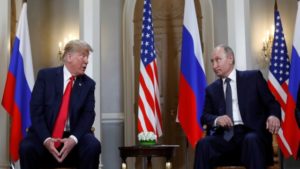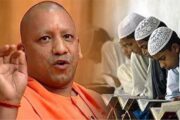
President Trump threatened to cancel his meeting with Russian President Vladimir Putin G-20 summit in Buenos Aires, due to Russia’s maritime clash with Ukraine
US President Donald Trump has said on Tuesday, November 27, that he may cancel a meeting with his Russian counterpart Vladimir Putin following a maritime clash between Russia and Ukraine. saying that “I don’t like that aggression.”
Trump told the Washington Post he was waiting for a “full report” after Russian ships fired on and seized three Ukrainian boats on Sunday, November 25. A Crimean court was expected to decide the fate of detained Ukrainians on Wednesday, the BBC reported.
The US President has told The Post that the report coming from his national security team would be “very determinative”. “Maybe I won’t have the meeting (with Putin). Maybe I won’t even have the meeting. I don’t like that aggression. I don’t want that aggression at all,” he said.
The two leaders were due to meet on the sidelines of the G20 summit in Buenos Aires later this week and discuss security, arms control, and issues in Ukraine and the Middle East after the meet convenes on Friday, national security adviser John Bolton told reporters but he failed to mention whether Trump planned to challenge Putin over the naval incident.
The US has also urged European states to do more to support Ukraine.
State department spokeswoman Heather Nauert said Washington wanted to see tougher enforcement of sanctions against Russia.
Russian coast guard ships opened fire on Sunday as two Ukrainian gunboats and a tugboat sailed through the Kerch Strait off the coast of Crimea, which was annexed by Russia in 2014. Further Russia captured three Ukrainian naval ships and their crews in the Black Sea on Sunday, an act that drew condemnation from the West and led to Ukraine preparing to impose martial law in 10 of the country’s 27 regions.
The Russian action appears to fit a pattern in which the Kremlin takes provocative action and then gauges international reaction before moving further. Russia annexed Crimea from Ukraine four years ago after a series of smaller steps that the West called provocations
Twenty-four Ukrainians were detained and at least three were wounded in the incident.
Ukraine described it as an “act of aggression” but Russia said the ships had illegally entered its waters.
A Crimean court later ordered that 12 of the Ukrainians be detained for 60 days.
On Tuesday, Ukrainian President Petro Poroshenko said there was a threat of “full-scale war” with Russia, a day after Kiev imposed martial law for a 30-day period from November 26 in 10 border regions, the BBC reported.
“The number of (Russian) tanks at bases located along our border has grown three times,” he said.
Five of the 10 regions border Russia while two are adjacent to Moldova’s breakaway Trans-Dniester region, where Russian troops are stationed. The other three regions border the Black Sea or Sea of Azov close to Crimea.
UN Ambassador Nikki Haley spoke for the administration when she condemned the incident Monday.
The Russian action appears to fit a pattern in which the Kremlin takes provocative action and then gauges international reaction before moving further. Russia annexed Crimea from Ukraine four years ago after a series of smaller steps that the West called provocations.
Trump has been under pressure to back out of the Putin meeting so as not to appear to endorse the latest action, which Haley had called unacceptable aggression.
source: NH






































